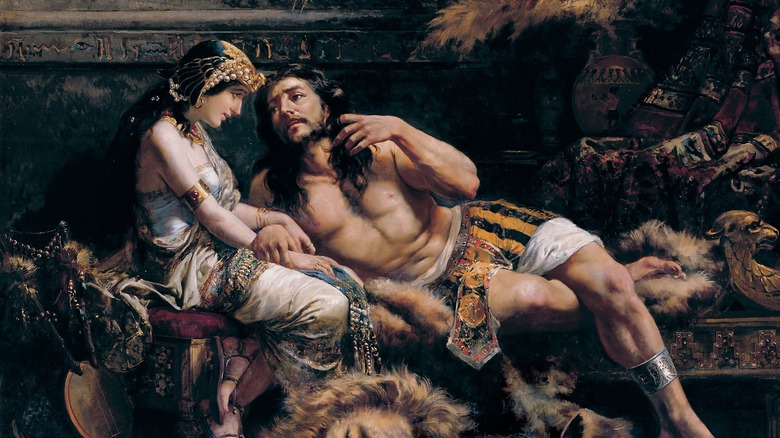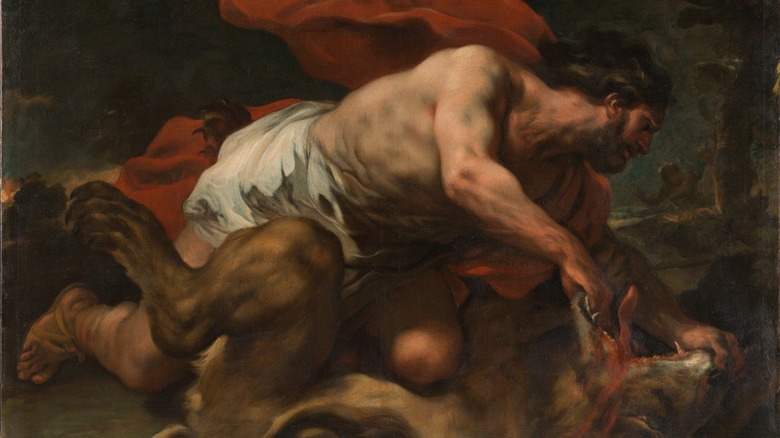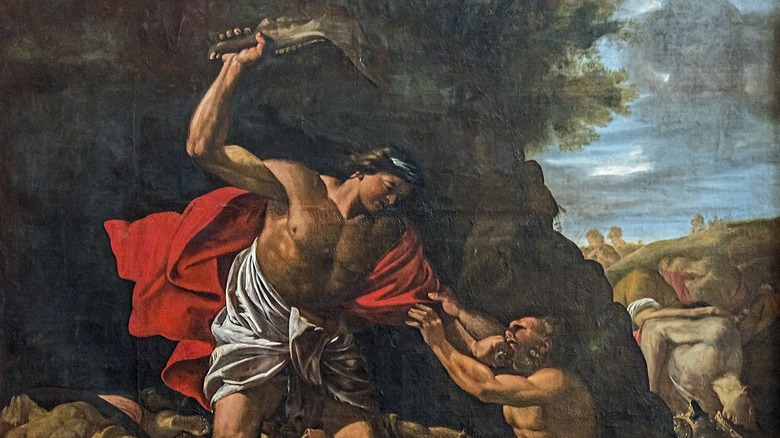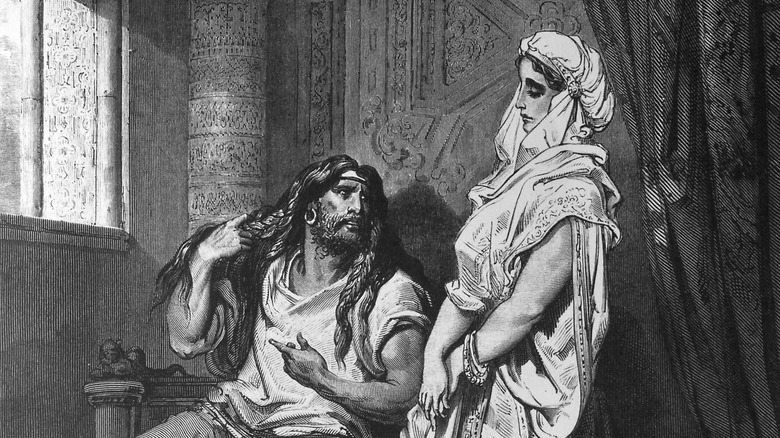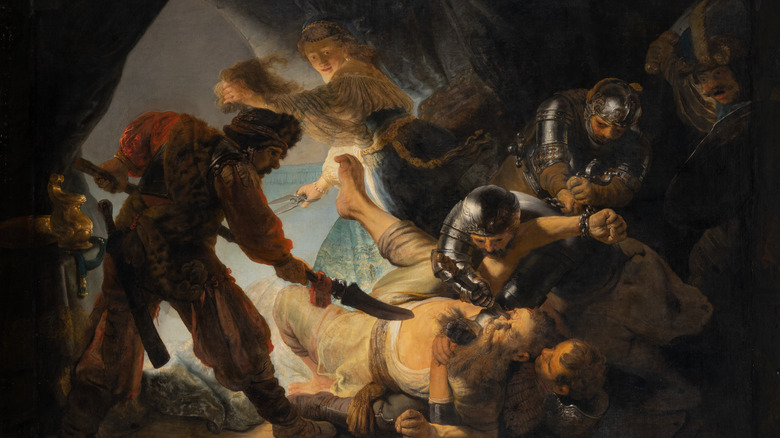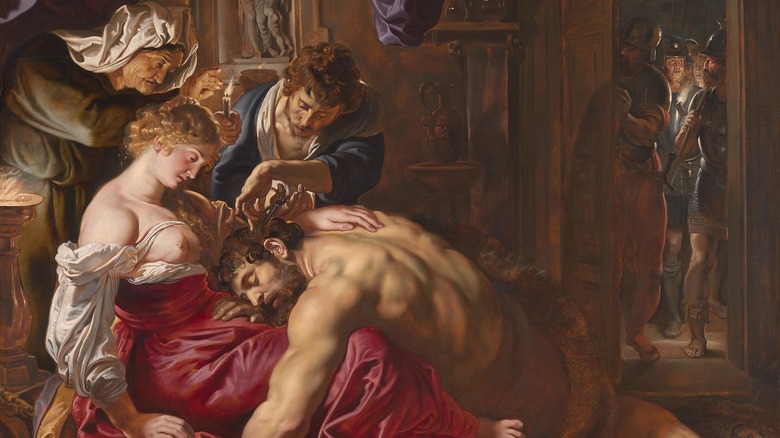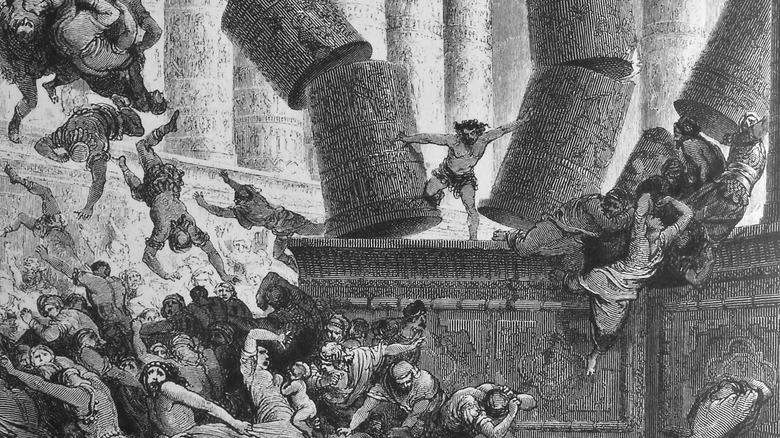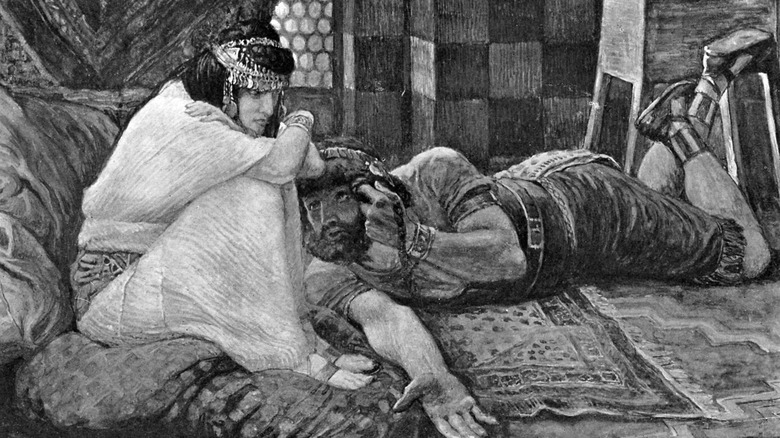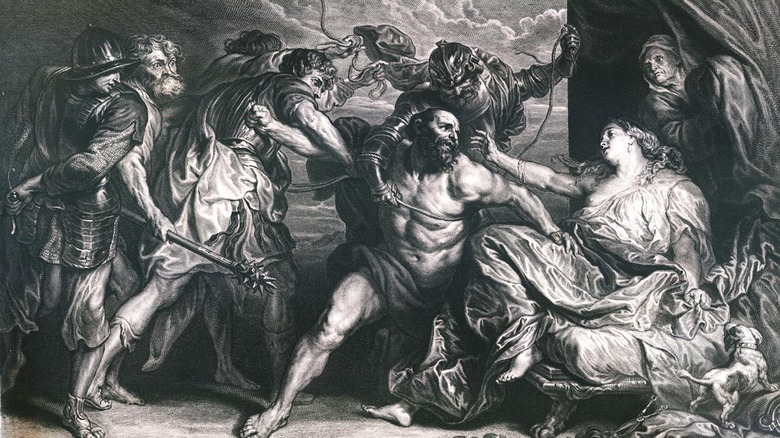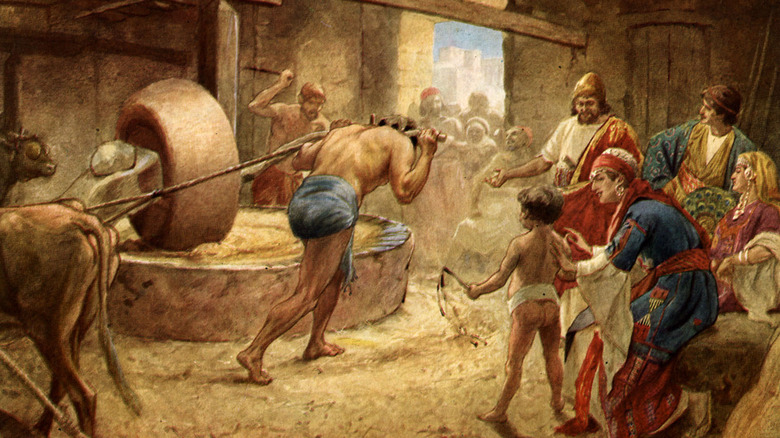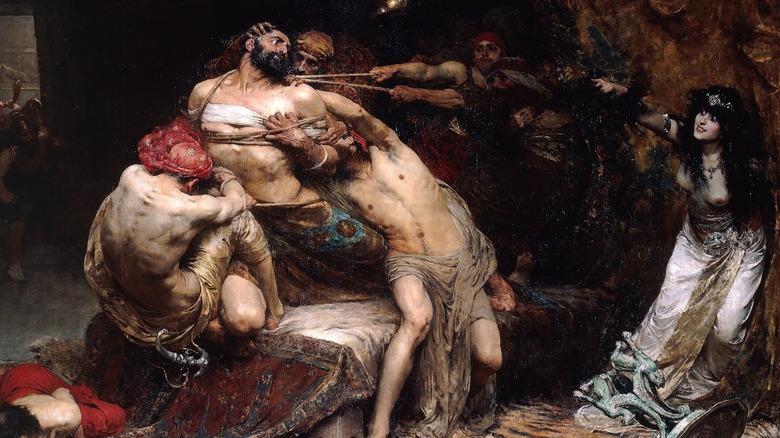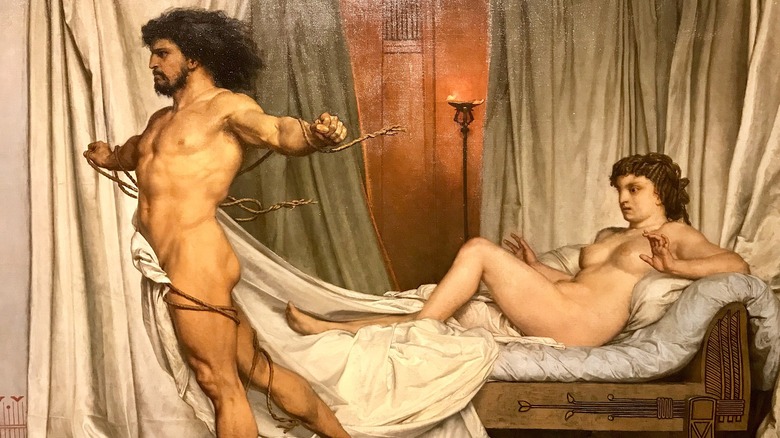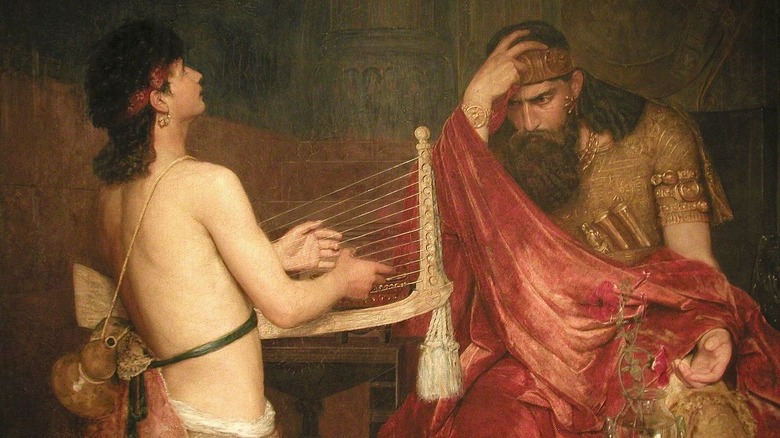The Untold Truth Of Samson And Delilah
Samson and Delilah are a power couple that go together like Alex and JLo, John and Ono or Cleopatra and Marc. Well, almost, since Samson and Delilah's relationship is centered on one of the most famous seductions in biblical tradition. As told in the Book of Judges, the story tells how Samson became a Judge, one of the leaders of ancient Israel after the Exodus from Egypt. He was a superhumanly powerful man who made war against the Israelites' enemy, the Philistines.
The Philistines, however, managed to strip his powers through the actions of Delilah, who was bribed by the Philistines to find out Samson's secret. She wheedles from Samson the critical information that if his hair was cut off, his superhuman strength would vanish. It was in this way that Delilah betrayed Samson. Samson's hair was cut while he slept, and then he was captured. The Philistines blinded Samson by gouging his eyes out and enslaved him. However, in a final act of grace from Yahweh (the name of God in the Hebrew Bible), he is given his old strength back. Samson then destroys the pillars of a temple to the Philistine god Dagon, collapsing the building and killing not only himself, but countless Philistines.
At the story's surface, Samson seems to be the hero who is seduced by the archetypal temptress, Delilah. However, the truth of the Samson and Delilah tradition is far more complicated than that. Let's find out why.
The key to understanding Samson and Delilah is that Samson was a Nazarite
The story of Samson and Delilah starts at a time when the Philistines were dominating the Israelites. The Book of Judges explains that Samson's father, Manoah, and his unnamed mother had been trying to have a child without success. An angel appeared and told Samson's mother that she would have a son. The angel explained, "Now therefore beware, I pray thee, and drink not wine nor strong drink, and eat not any unclean thing. For, lo, thou shalt conceive, and bear a son; and no razor shall come on his head: for the child shall be a Nazarite unto God from the womb: and he shall begin to deliver Israel out of the hand of the Philistines."
So what is a Nazarite? As described by Britannica, Nazarites were those who gave special service to God. This was marked by abstinence and also by not cutting their hair. Britannica further explains that Nazarites were holy men who were often imbued by the "Spirit of the Lord" to do miraculous things. In Samson's case, he was granted superhuman strength. For example, in the Book of Judges, Samson kills a lion with his bare hands and kills a thousand Philistines with the jawbone of a donkey.
Samson wasn't a great Nazarite
Despite Samson being a Nazarite, he did have a screwy moral compass judging by ancient Israelite standards. According to "The Failure of the Family in Judges," Samson broke one of the cardinal ethics of the time by demanding to marry a Philistine from Timnah. Manoah objected to his son, saying, "Is there never a woman among the daughters of thy brethren, or among all my people, that thou goest to take a wife of the uncircumcised Philistines? And Samson said unto his father, Get her for me; for she pleaseth me well."
According to the Jewish Women's Archive, this act has been debated, with some Rabbis saying that Samson sinned when marrying the Philistine woman, while others stating that it was part of Yahweh's plan to smite the Philistines using Samson's superhuman strength.
How was this part of God's plan? As told in the Book of Judges, this started a series of events which eventually, through a series of ever-bloodier episodes, led to the murder of Samson's Philistine wife and father-in-law. Samson took revenge by the slaughter of a thousand Philistines with a donkey's jawbone.
Delilah wasn't the first woman Samson was interested in
On the whole, Samson strikes the reader as being a short-term thinker guided purely by his appetites. Scholars have argued that these failures on the part of Samson are reflective of the sins of the Israelites at that time. While there may be debate as to whether his marriage to the woman of Timnah is sinful or not, it is clear that Samson was not exactly mindful of his Nazaritic lifestyle. As the Book of Judges relates, Samson at some point after he laid the smack down on the Philistines journeyed to Gaza where he "saw there an harlot, and went in unto her."
The Jewish Women's Archive suggests that from this point, Samson's sins were sexual in nature. Later in the narrative, when Samson is imprisoned by the Philistines, he is held as a tohen ("mill slave"), which has been taken by rabbis to refer to sexual sins. It is implied that Delilah's betrayal was a punishment for Samson's womanizing ways.
Delilah is assumed to be a Philistine sex worker but no one knows for sure
The actual text of the Book of Judges describes Delilah as "a woman in the valley of Sorek" with whom Samson had fallen in love. This is the first instance where the text says that Samson actually fell in love with a woman. As analyzed by the author of "Who Cut Samson's Hair?" the text neither gives her occupation nor her ethnicity, but it has long been assumed that Delilah is a Philistine sex worker.
The Valley of Sorek is located right on the cusp of Israelite territory so geographically, Delilah could be either Philistine or Israelite. One important point is that Delilah as a name is constructed in a fashion common to Semitic languages, according to the same source. The problem is one of assumption. The reader assumes that Delilah is a Philistine since Samson had only been interested in foreign women. The reader also assumes she is a harlot because those are the women who were previously mentioned in the biblical narrative.
Samson loves Delilah in the text, which is different than the carnal lust shown for the other women in his life. Delilah is also the only named woman in the Samson narrative. Not even Samson's mother is named, although she was the one who first met the angel that predicted Samson's birth.
Delilah may have cut Samson's hair herself
The Book of Judges relates how Delilah was bribed by the Philistines to find out the source of Samson's strength. When Samson first replies to Delilah, he says that if he was bound with seven cords that were never dried, he would be weakened. She informed the Philistines of this, who promptly provided her with the necessary materials. Then Delilah bound Samson while a group of Philistine men waited in the next chamber. She then tested Samson by shouting that the Philistines were there. He broke the bonds easily. Delilah went through this process several times, finally essentially telling Samson that he did not love her since he kept lying. Samson finally relented and told her that if his hair was shorn, he would lose his power. Then, during another visit, Samson fell asleep upon her lap. At that point, Delilah called for a man to shave seven locks from his head.
So who is this guy who cuts Samson's hair? "Who Cut Samson's Hair?" points out that it couldn't be a Philistine, since they were lying in wait in the next chamber and were too fearful of the Nazarite to come closer. However, after analyzing the text, the author concludes that it is probable that Delilah called to a man, not for a man. And that man was Samson. She wanted to check if he was awake. When Delilah found Samson asleep, she cut off his hair herself while he slumbered blissfully.
Was Samson really a Greek warrior?
Samson is revered as a great hero of the Old Testament and is comparable to the Greek hero Heracles. As noted in "The Legends of Samson/Heracles," there are a number of similar tales, such as both slaying lions with their bare hands, both breaking bonds by flexing muscles, and both wielding clubs. Also, both heroes fell to a woman's wiles. In the case of Samson, it was Delilah and in the case of Heracles, to Queen Omphale, to whom he was enslaved. The author concludes that the Israelites must have become familiar with Greek legends through the Philistines, which influenced their own tales.
Archaeological findings may indicate that Samson and Delilah might not just have been influenced by Greek mythology, but that they may even have been ancient Greeks.
According to Haaretz, findings at the site of Tell el-Qadi have raised some eyebrows. This site has been identified as the city of Dan, which was controlled by the Israelite tribe of Dan. Artefacts found here include Aegean pottery, figurines, and other cultural items. There were also other material items from Egypt and Syria. Notably, the Book of Judges states that Samson was a part of the Israelite tribe of Dan.
While the findings are not conclusive by any measure, there has been speculation that the Danites, which would include Samson, originated from Greece — possibly even being mercenary warriors hired by the Egyptians, who were overlords of the region.
The writers of the Bible didn't want the story of Samson and Delilah in it in the first place
Because the Samson and Delilah story has so many elements of Greek mythology, it may be that the original writers of the Hebrew Bible didn't want it in there in the first place.
"The Strange Biography of Samson" traces how throughout the Book of Judges, the situation for the tribes of Israel becomes worse and worse under an ineffective political system. It also points out how more narrative space is given to Samson more than any of the other Judges from that period in ancient Israel's history. There are also scandals and sexual acts that are not typical for other parts of the Hebrew Bible. The story itself is very comparable to the mythology surrounding Heracles.
The author conjectures that the story in original form may have been Philistine in origin, told from the perspective of Delilah, who conquered the foreign hero. The tale, being very popular during the time of the narrator's life, could not be excluded from the scripture. However, the narrator adjusted the text, which ultimately tried to conform a polytheistic myth story to monotheistic sensibilities.
Samson's lost his strength not just because Delilah cut his hair
The Book of Judges says that Samson said to Delilah, "There hath not come a razor upon mine head; for I have been a Nazarite unto God from my mother's womb: if I be shaven, then my strength will go from me, and I shall become weak, and be like any other man."
It is often assumed that Samson's strength was because of his hair, and that when Delilah cut it, that destroyed his power. As discussed in Aleteia, the truth is more subtle. Samson's strength resided not in his hair, but in his Nazarite vows. The hair was just an outward symbol. Samson had a reckless record of immoral behavior. Not only did he dally with women, but surely he handled the corpses of those he slew. Plus, it seems improbable that there was no strong drink at his wedding. It seems that the cutting of his hair was the last straw, at least with Yaweh.
In fact, perhaps Samson was just asking to be neutered. "What Was Samson Thinking in Judges 16,17 and 16,20?" posits that Samson was under severe emotional fatigue and restlessness that was caused by his incredible powers. He wanted rest, and was able to get that sleep through Delilah, who had his hair cut off. Samson thought that he'd be able to survive without it. That, of course, was misguided considering what the Philistines did to Samson.
The story of Samson and Delilah is really just a critique on Israelite society
In many ways, the story of Samson and Delilah is the biblical narrators' criticism of the chaotic time before the monarchy in ancient Israel. As analyzed in "Historical and Political Contexts of Samson and Delilah," the story is unusual for the Hebrew Bible since it has a large amount of sexuality and gender reversal in the context of a foreign-occupation. So what is going on here?
This section of the text was likely written during the period of the Babylonian captivity when the Israelites were held by the Persian Empire. Moral themes concerning the evilness of foreign influences (particularly women) pervade throughout. Samson's fall to Delilah shows how immoral Israelites will fall to foreigners if they do not follow Yaweh. The author also uses materials that seem to clearly justify the establishment of a monarchy because of the chaos that existed during the time of the Judges.
Delilah is one of the only feminists in the Bible
The Samson and Delilah story is a unique story for the Hebrew Bible. As explained in "A Feminist Companion to Judges," Delilah may be history's first sex symbol and the name is now synomous with "a temptress; an alluring object." She is a strong character who, unlike most other female characters in biblical tradition, has her own agency.
While Eve was fooled by the serpent in the Garden of Eden, Delilah made a free choice and, using her own intelligence and capabilities, brought down who was thought to be invulnerable. It is for these reasons that Delilah has been tarnished. Even though the Book of Judges doesn't state it, Delilah has been assumed to be a harlot and a Philistine. The truth is that both are just assumptions. Also, Delilah simply disappears from the narrative after she hands Samson over to the Philistines. Whether Yahweh smote her or not is never told.
All of these factors have made Delilah a figure of fascination since she breaks the mold of the archetypal biblical female character. Delilah is the archetype of the seductress. Yet perhaps this is unfair. Maybe Delilah is really one of the few women in the Bible who has her own power and independence. Perhaps Delilah was really a feminist.
Samson and Delilah may have just liked kinky sex
Another factor that makes the story of Samson and Delilah so unique is the layers of not just sexual innuendo throughout the narrative, but kinky sexual innuendo. "Women's Bible Commentary" argues that under analysis, Samson seems to be a person who deliberately seeks out and enjoys violence and sex. If that characterization is correct — and all the evidence seems to point that it is true — then his obsessive love for Delilah is explainable. Delilah provides the type of sexual violence that Samson craves.
In this role, Delilah is a dominatrix. Over and over again, she ties up Samson with ropes, which he breaks only when it becomes too much for him. Finally, when Samson gives away his secret about his hair, it may be construed that Samson desired to escalate the dangerous sex games to the point where his own life is in jeopardy.
"Women's Bible Commentary" states another possibility: "Could it be that Delilah and the Philistine men were ready to rape Samson?" The author points out how the word choices in Hebrew that are used to describe the scene once Delilah had Samson subdued are usually translated as "to afflict" or "to weaken" or "to subdue," but commentators don't use "to rape" under the assumption that women cannot rape men. Also, such an interpretation would destroy the image of Samson as the ultimate heterosexual male hero.
Delilah might just be a stand in for David
Some biblical scholarship looks beyond the straight up narrative of Samson and Delilah for metaphors that reflect conflicts in the history of ancient Israel at the time the narrative was written. "Saul and the Samson Narrative" is such a piece of research, which contends that Samson and Delilah are stand-ins for Saul and David, with the narrative being written by a supporter of King Saul.
Simplified, David essentially usurped the throne of the Kingdom of Israel from Saul. Saul is like Samson since both men are liberators who are empowered by the divine spirit. David is similar to Delilah since both characters orchestrate the downfall of the hero. The author points out, "The pro-Saul writer of the Samson story was so enraged with David as to portray him as a Philistine woman and a seducer who pretended to be on the hero's side yet was really a Philistine agent. It was Delilah who cut off Samson's hair and handed him over to the Philistines. In the same way David revealed the secret of Saul's military disadvantage to the Philistines."
